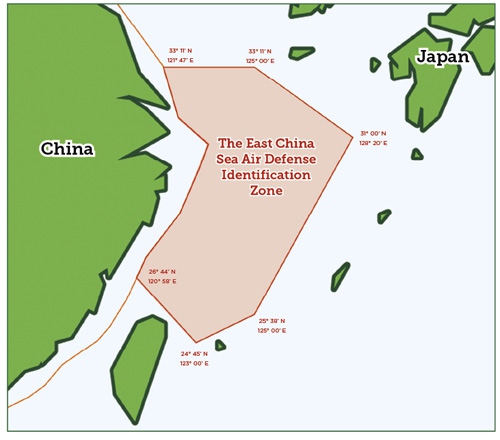|
Observers noted that Tokyo and Washington should examine their own policies carefully and refrain from making blind accusations against others.
General Luo said the ADIZ is in effect a kind of preventative measure aiming to avoid accidents.
Some observers credited the dispute between China and Japan over the Diaoyu Islands to the latter's concern regarding the air defense zone. The ADIZs of China and Japan overlap one another, each covering the disputed islands.
Actually, the status quo surrounding the territorial dispute, which lasted for decades under the principle of shelving the matter for future generations of leadership, was already broken more when the Japanese Government launched a unilateral move to "nationalize" the islands.
The dispute was shelved when the two countries restored official relations in the 1970s with tacit consent of state leaders on both sides. As China and Japan were normalizing relations and finalizing the Sino-Japanese Treaty of Peace and Friendship, the leaders of the two countries at that time, acting in the larger interest of China-Japan relations, reached an important understanding and consensus on "leaving the issue of Diaoyu Islands to be resolved later."
However, in 2012, Tokyo took a unilateral move to "nationalize" the Diaoyu Islands, in an attempt to formalize its so-called "actual control" of the islands.
Luo said this provocative act by Japan is what altered the status quo in the region, originally triggering current tensions in the East China Sea.
The repeated U.S. declarations that the Treaty of Security and Safeguard between Japan and United States is applicable to the Diaoyu Islands dispute have further intensified the regional situation, Luo added.
U.S. inflammation
In their statements, both Washington and Tokyo accused Beijing of taking unilateral action and undermining the stability of the Asia-Pacific region by establishing the ADIZ. But in fact, observers said Tokyo and Washington are responsible for worsening the situation and posing a threat to peace and stability in the region.
Yang, the MND spokesman, told reporters, "China has always respected other countries' right of free flight in accordance with international laws, and China's establishment of the ADIZ over the East China Sea will not change the legal nature of relevant airspace. Routine international flights in the zone will not be affected."
Despite China's full explanation of its actions, the United States appeared to intent on inflaming tensions in the region when it sent two Air Force B-52 bombers into China's East China Sea ADIZ. The Chinese military then scrambled its own aircraft to monitor the U.S. bombers for the entire course.
Luo said the flights, which took place two days after China's announcement of the ADIZ, demonstrated U.S. hegemony. It has sent a very negative signal to Japan and could only add fuel to the regional situation.
China's National Defense Ministry responded at the subsequent press conference to the U.S. provocation, saying that "China has the capability to conduct effective control over relevant airspace."
Luo said that in light of China's ADIZ establishment, it is sure to have paid careful consideration to any potential outside reactions, adding that all sides should remain committed to using diplomatic means to ease tensions in the East China Sea.
Email us at: yulintao@bjreview.com

| 